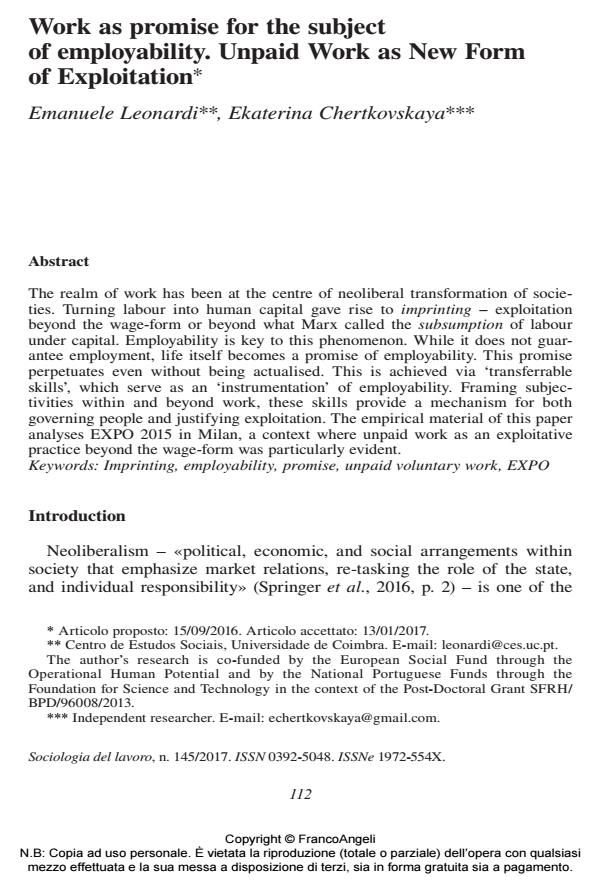Work as promise for the subject of employability. Unpaid Work as New Form of Exploitation
Journal title SOCIOLOGIA DEL LAVORO
Author/s Emanuele Leonardi, Ekaterina Chertkovskaya
Publishing Year 2017 Issue 2017/145
Language English Pages 19 P. 112-130 File size 128 KB
DOI 10.3280/SL2017-145007
DOI is like a bar code for intellectual property: to have more infomation
click here
Below, you can see the article first page
If you want to buy this article in PDF format, you can do it, following the instructions to buy download credits

FrancoAngeli is member of Publishers International Linking Association, Inc (PILA), a not-for-profit association which run the CrossRef service enabling links to and from online scholarly content.
The realm of work has been at the centre of neoliberal transformation of societies. Turning labour into human capital gave rise to imprinting - exploitation beyond the wage-form or beyond what Marx called the subsumption of labour under capital. Employability is key to this phenomenon. While it does not guarantee employment, life itself becomes a promise of employability. This promise perpetuates even without being actualised. This is achieved via ‘transferrable skills’, which serve as an ‘instrumentation’ of employability. Framing subjectivities within and beyond work, these skills provide a mechanism for both governing people and justifying exploitation. The empirical material of this paper analyses EXPO 2015 in Milan, a context where unpaid work as an exploitative practice beyond the wage-form was particularly evident.
Keywords: Imprinting, employability, promise, unpaid voluntary work, EXPO
- Uber in the Portuguese gig economy: a laboratory for platform capitalism Emanuele Leonardi, Giorgio Pirina, in Work Organisation, Labour & Globalisation /2020
DOI: 10.13169/workorgalaboglob.14.2.0046 - Employability Tilly South, pp.9 (ISBN:978-1-83708-105-9)
- Making Sense of Exploitation: Teenage Workers’ Experiences of Unpaid Labour in Low-Wage Service Jobs Anna Kallos, in Work, Employment and Society 09500170251380738/2025
DOI: 10.1177/09500170251380738 - Between a Promise and a Salary: Student-Migrant-Workers’ Experiences of Precarious Labour Markets Olivia Maury, in Work, Employment and Society /2020 pp.809
DOI: 10.1177/0950017019887097 - The Palgrave Handbook of Environmental Labour Studies Anna Saave, Barbara Muraca, pp.743 (ISBN:978-3-030-71908-1)
- A Quest for Passion: Understanding Precarious Migration of Young Highly Qualified EU Citizens as Lived Neoliberal Subjectivity Anna Simola, in Sociology /2022 pp.621
DOI: 10.1177/00380385211051224 - An Empirical Study on the Improvement of College Students’ Employability Based on University Factors Yi-Cheng Zhang, Yang Zhang, Xue-li Xiong, Jia-Bao Liu, Rong-Bing Zhai, in Frontiers in Psychology 793492/2022
DOI: 10.3389/fpsyg.2022.793492 - Beyond the Narratives of Experience and Money: The Formation of Teenage Students as Labor in Sweden Anna Kallos, in Critical Sociology 08969205251346899/2025
DOI: 10.1177/08969205251346899
Emanuele Leonardi, Ekaterina Chertkovskaya, Work as promise for the subject of employability. Unpaid Work as New Form of Exploitation in "SOCIOLOGIA DEL LAVORO " 145/2017, pp 112-130, DOI: 10.3280/SL2017-145007